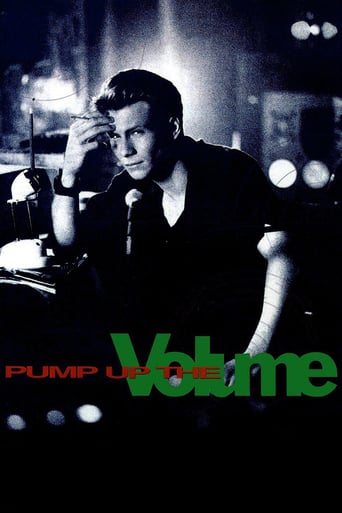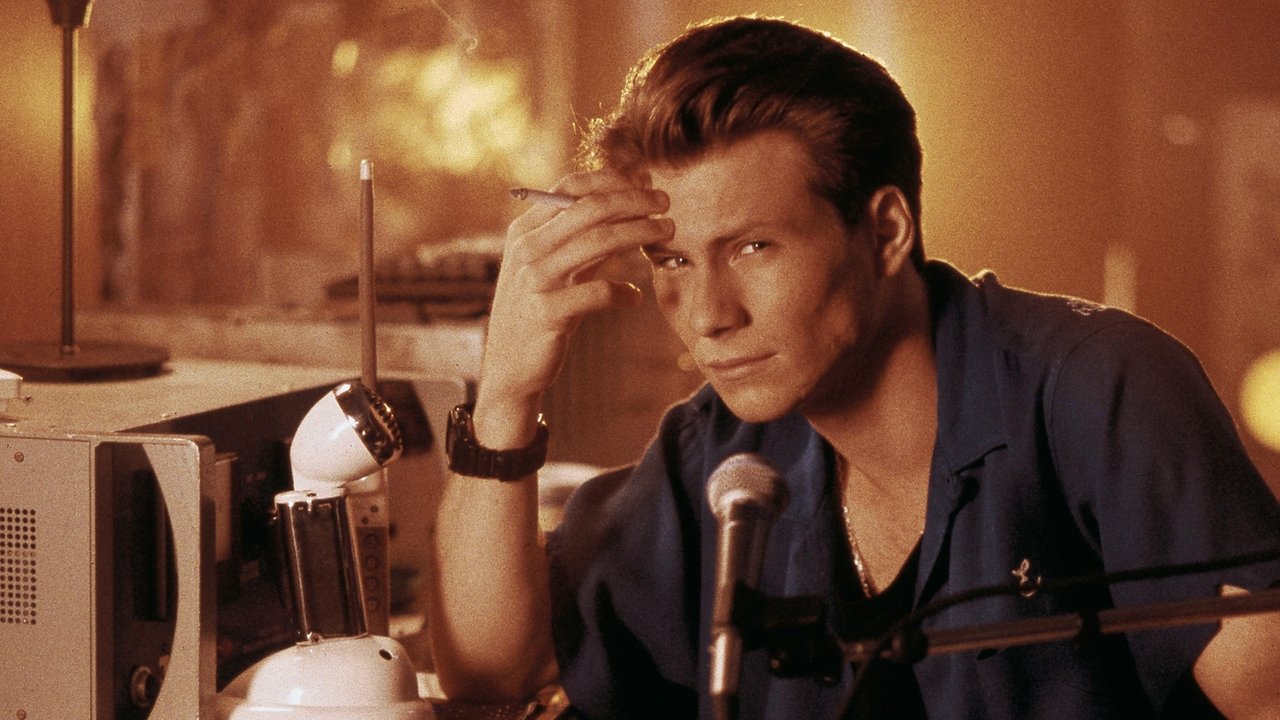ashmanbrian
Wow is all i can say to this movie - this will most likely be the only review I will ever write, after being a long time user of IMDb.This movie is my favorite for the basic fact that I saw it when I was a teenager, being 17 years old it spoke to me - In a little less dramatic way than that of the movie. The attitude of defining normal, in a society where conforming is forced. He becomes the voice he was himself searching for, touching the hearts and minds of his peers. And in doing so he goes from a quite, shy, confused out of place teenager to a strong bold lay it all on the line young adult.Slater has a reserved place in my retro nostalgic memories and I salute him and Mathis for the performance that will forever remind me how awesome young love was and the hope I have that all will experience it in whatever form at at whatever age. And forever reminding me that everyone has a voice, but take care - you are responsible for what you say, because you cant take it back once the words have left your lips.Peace.
tieman64
"Everything is backwards; everything is upside down. Doctors destroy health, lawyers destroy justice, universities destroy knowledge, governments destroy freedom, the major media destroy information and religions destroy spirituality." - Michael Ellner Alan Moyle's "Pump Up The Volume" stars Christian Slater as Mark Hunter, a high school student who lives in a sleepy, Arizonan town. Looking to lash out at the world, Mark starts an FM pirate radio station. This station becomes an outlet for his angst and aggression. The film then becomes a teen version of "Network" or "Rebel Without a Cause", Mark rallying fellow disaffected and alienated youths until he becomes the unwitting leader of a minor student revolution.In historical terms, Hunter's caught in the deadlock of late capitalism, or what Francis Fukuyama called "the end of history", a time populated by what Nietzsche called "the last men"; pathetic, contemptible things. Fukuyama's position counterpointed that of Hegel and Marx, who saw historical development as a purposeful journey from primitive stages of consciousness to "something better". This goes against the "there is no alternative" (T.I.N.A) mantra of late capitalism, a stance explicitly reborn in the mid 20th century, but which has bee around in various forms much longer, perhaps starting with Thomas Malthus, a nineteenth century progenitor of "no alternative" politics and its credo of "permanent" scarcity and "necessary poverty". Malthus contested nineteenth century radicals who were steadfast in their belief that labour, properly deployed, could usher in a new society. Indeed, the initial need for elites to publicly announce the absence of any alternative to existing social arrangements was entirely a defensive move, in response to such radical ideas.One of the first to counter T.I.N.A was William Godwin. In his 1793 book, "Enquiry Concerning Political Justice", he argued that the "existing state creates a servile and truckling spirit," and that the cruel monotony of the system "produces a kind of stupid and hopeless vacancy in every face". From Godwin can be drawn a line to libertarians, anarchist communism, socialism and even the labour theory of value. The British government then tried to prosecute Godwin for treason, but abandoned the idea. Godwin was instead attacked by Malthus, who in "Principles of Political Economy" essentially defended class structures and even went so far as to advocate starving the poor because "that way they wouldn't breed too heavily". In anticipation of the permanent war economy of the United States, Malthus would even offer war and state debt as perfect mechanisms for "enhancing value through the careful calibration of scarcity".So though white and privileged, Hunter's part of a long list of validly ticked off people. On air he calls himself "Hard Harry", and begins his radio program with Leonard Cohen's "Everybody Knows", the lyrics "everybody knows the dice are loaded, everybody rolls with their fingers crossed" heralding his audio rants. "All the great themes have been used up and turned into theme parks," he tells his audience, as he begins to develop a sort of naive political manifesto. Where adults condescend, he empathises, where they ignore, he provides an outlet for the hopes, dreams, fears and tragedies of other youths.Elsewhere Hunter challenges the ethos of his college, which cares more about test scores and image than actual education. Unsurprisingly, his college is named after Hubert Humphrey, a despicable archetype of cold war neoliberalism and apologist for much violence (Vietnam, the police beatings of peace activists etc). "The truth is a virus," Hunter tells his listeners, as he becomes increasingly subversive and empowering, shaking fellow students out of apathy. "It begins with us! Not the experts, but the ones who need it most!" Pretty soon he's changed from an object of hero worship to one of strategic appropriation, youths taking from him what they need to advance their own empowerment and emancipation. Elsewhere the songs he plays are politically charged, but in offbeat ways. There's "Freedom of Speech" by Above the Law, Ice T states "I've no time to whisper in your ear", Hunter plays "Wave of Mutilation" by the Pixies, has Soundgarden say "Accused and convicted for nothing" and Liquid Jesus "Stand, and they will make you crawl"."Nothing is more important than a good education!" adults tell Hunter. "Except the basic right to it," he counters. Slowly he moves from isolation and individualism to community and collective action. He accepts that he has a responsibility to his listeners, understands that meaning and expression are terrains of political contestation, repeatedly fought over, but then quickly finds himself chased by the police and FBI. They want to shut him down. To silence him. The film ends with Harry on the run, romantic engagement finally deemed inadequate, until a final sequence in which every student in America starts their own pirate radio station. This is offered as something positive, but the internet/Facebook generation's told us otherwise: the podiums afforded by technology increase atomization and tend to become just more outlets for narcissism.Traditionally, young people have energised democratic movements. But resistance to domination has been subdued and power has long created societal institutions designed to break resistance. The young, reflexively impotent, are perhaps now entirely acquiesced to the idea that they can and will be repeatedly screwed. Large debts, and the fear they create, have become a pacifying force. Elsewhere we psychopathologize and medicate noncompliance, a fact which led Erich Fromm to state that "today the function of psychiatry and medicine threatens to become the tool in the manipulation of man." Indeed, schools themselves inculcate compliance not democracy, and routinely traffic standardisation and fear. The intelligent are shamed, surveillance is normalised and fundamentalist Religion and Fundamentalist Consumerism are exalted above all things. And so, like Howard Beale, Hunter yells from a radio, before being shut down.8.9/10 – One of the best teen movies of the 1990s, despite a weak, corny third act.
bkoganbing
In a career dotted with offbeat and quirky roles Christian Slater was at his most offbeat and quirky in Pump Up The Volume. Slater plays a young transfer student from an eastern high school to a new school in Arizona. His Clark Kent persona is a mild mannered wallflower type. But his father made the mistake of giving him a short wave radio set to keep in touch with friends back east who are presumably ham radio operators. What Slater does is create his own pirate radio station and starts with another whole personality of disc jockey Harry Hardon. Slater's other self isn't Superman, he's more like a teenage version of Howard Beale from Network.He's amusing at first until one of the students commits suicide after calling in and Slater does little to discourage his intentions. That's a hard call to make, even professionals miss telltale signs of that kind of serious depression.But when Slater starts disrupting the power structure in the person of principal Annie Ross, the hunt is on with even the Federal Communications Commission brought in to track down this broadcasting felon. Imagine Nurse Ratched from One Flew Over The Cuckoo's Nest as a school principal and you've got Ross. The main weakness of Pump Up The Volume is that Slater and Ross create the only two memorable characters. All the rest are strictly in support, we get no insights into any of the rest of the cast. But these two are memorable characters. A teenage mad prophet of the air and a school principal from hell.Pump Up The Volume is a staple for Christian Slater fans.
Bifrostedflake
I first saw this film around 1996, when I was 13 and just going into that 'I hate the world and everything about it' phase that most teenagers go through. I fell in love with it there and then and over the years I've owned 5 separate copies.Not just because of the unbelievably brilliant soundtrack, not just because of the real and relate-able characters, not just because of the engaging and original plot, but because I still feel now, what I first felt when I saw the film. Sometimes everyone feels that they're alone and it takes another voice, one coming from a someone you might not even ever have met reminding you that everyone feels that crushing loneliness and only you can change that.Even now that I'm nearing my mid-twenties and every time I watch this film I want to 'Rise up in the cafeteria' and 'stab my teachers with a plastic fork.' Being a teenager sucks, its probably the most free time of your life, but everything from parents, to homework, to hormones prevents most from truly enjoying the experience.I want every teenager to watch this film, I want every person who looks back on their teen years with regret to watch this film, I want every person who's forgotten what its like to be a teenager to watch this film. I think there's room in just about everyone's heart for it.


 AD
AD




